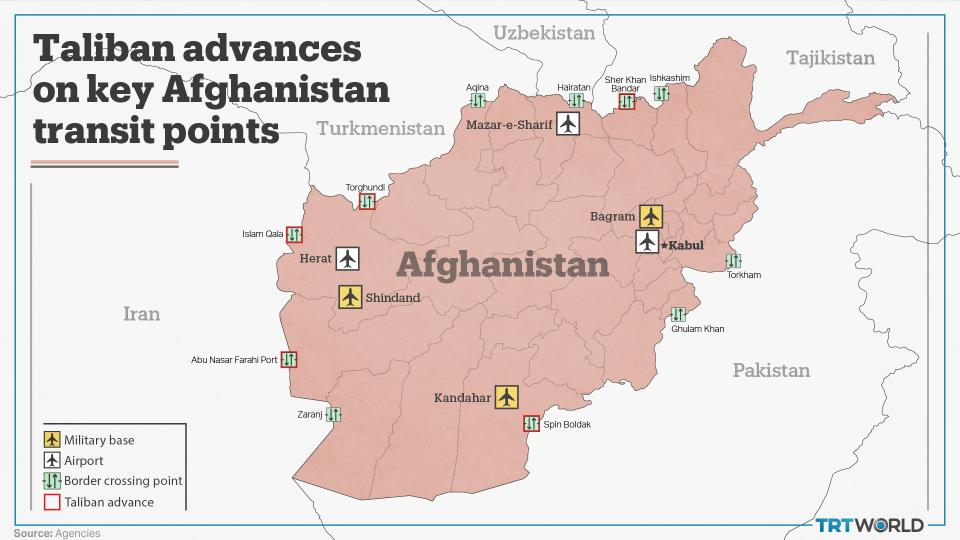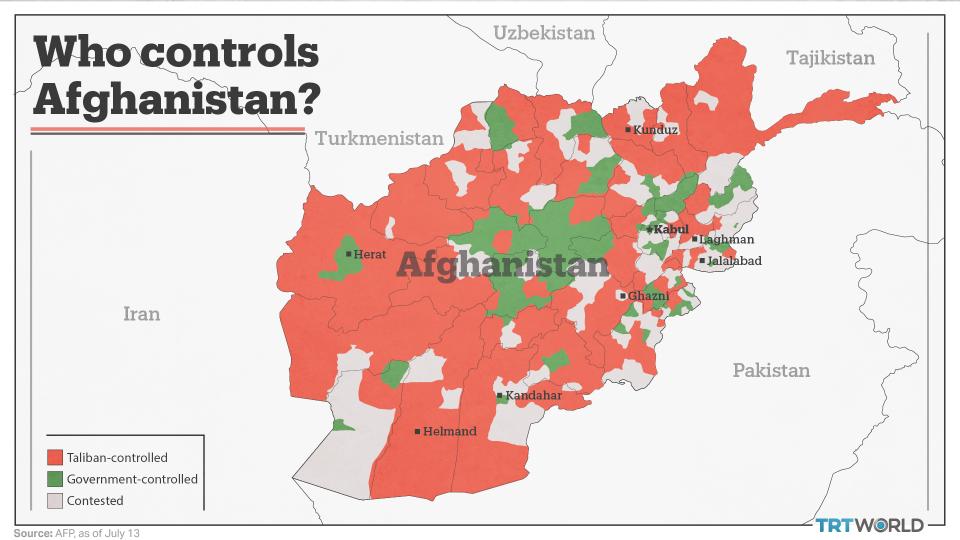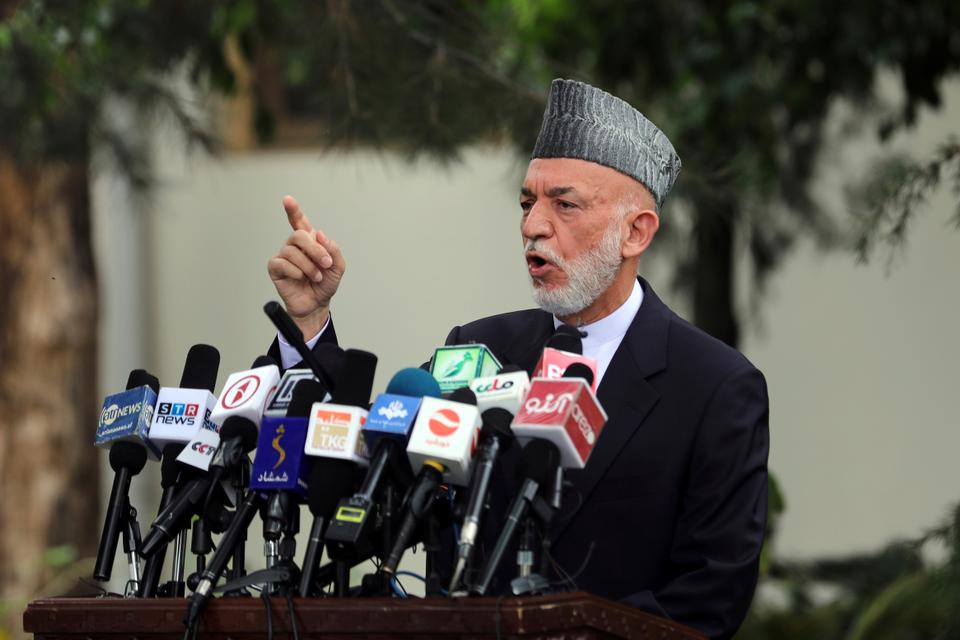

Murat Sofuoglu
The best scenario for the Afghan government appears to reestablish a political stalemate with the Taliban, but even that could favour the armed group in the long run.
As most of the US forces have left Afghanistan prior to the September 11 withdrawal deadline, the Taliban has launched a lightning offensive against the Afghan forces, taking over many districts while conducting different psyops to convince their rivals to yield. Much to the dismay of Kabul, the Taliban strategy has been effective.
While seizing outlying towns and villages, the Taliban is making swift progress and sending an unmistakable message to both the Afghan government and Western capitals that the group is invincible and is fully capable of holding onto the captured territories.
Experts portray various possible scenarios, ranging from a total Taliban victory across Afghanistan to a temporary political agreement, or a stalemate that divides the country between two power centres, one led by the Afghan government in Kabul and the other led by the Taliban.
“The biggest scenario appears to be that possibly the Taliban will take over the government in Afghanistan because they are not ready to share power with the current government and also key political players,” says Obaid Ali, a political analyst at the Afghanistan Analysts Network.
“They [the Taliban] are very keen to take over the government and they have proven that they are capable enough to overrun most parts of the country from the past one month when we have seen the fall of many many districts into the Taliban,” Ali tells TRT World.
As the Taliban overruns many districts, Afghan security forces have not shown “a solid resistance” to the armed group across the country, according to Ali. Because the Taliban takes over districts with its own power and influence, they will probably be less inclined to negotiate a political settlement with Kabul, he adds.
Recent reports have emerged that many Afghan security forces have either surrendered to the Taliban or fled to countries like Tajikistan, as the emboldened armed group began taking over several border crossings with Iran, Tajikistan and Turkmenistan. Most recently, the Taliban seized an Afghan border crossing with Pakistan, which has strong connections with the religiously-inspired armed group.

According to experts, the Taliban ensured the surrender of many Afghan forces using different tactics, from promising that Afghan troops will not be executed to facilitating district councils composed of elders to negotiate the surrender of government forces, who pledge that they will not fight against the Taliban in the future.
While many Afghan and non-Afghan security analysts have suggested that central government forces will be able to put up a fight against the Taliban, there is no serious evidence so far.
“I am very much surprised when I see security forces surrendered to the Taliban,” Ali explains.
Enayat Najafizada, the founder and CEO of the Institute of War and Peace Studies, a Kabul-based think-tank, sees the possible Taliban takeover of Afghanistan as “the worst-case scenario” and thinks it will “lead to a protracted conflict and violence in Afghanistan which will not be in the interest of both belligerent parties, neighbouring countries and the world at large.”
As a result, “countries such as Russia, India, Iran, China and Turkey [will] intervene and put pressure on all parties to come back to the negotiating table to find a peaceful solution to the decades-long conflict in the country,” Najafizada tells TRT World.
With or without the Taliban
According to Kamal Alam, a nonresident senior fellow at the Atlantic Council, there are mainly two political scenarios as the Taliban marches across the country.
“One is the complete Taliban takeover, however, not a military takeover but a political takeover. The Taliban knows that they can’t take over Kabul militarily. There is no way anyone allows it. They might be stronger in provinces and mountains, but they can’t take the city outright militarily,” Alam tells TRT World.

While the Taliban has “the military might”, they still need to go through a process of “very protracted negotiations to take cities,” the political analyst adds.
“Afghanistan's future lies in a Taliban hegemony,” says Bulent Aras, professor of international relations at the Qatar University.
“The question appears to be what kind of Taliban will lead Afghanistan. Whether it will be a Taliban, which will rule the country in an uncompromising manner or it will be a Taliban, which will seek some kind of consensus with other key Afghan political players,” Aras tells TRT World.
The second scenario could be the formation of a political agreement between the Taliban and “neutral” Afghans, who do not have “any connections” with the current Ashraf Ghani government, according to Alam. The Taliban has already signalled that the group might reach an agreement with those “neutral” forces, he says.
“This is where the former President Hamdi Karzai becomes a potential kingmaker. The influence of Karzai in Kabul is arguably greater than Ghani. Karzai is able to bring together all sides of Afghanistan on the table,” the political analyst adds.
While Karzai is now someone whom Washington does not like anymore, he has “very good regional relations” with Iran, Russia and China, Alam says. In the next few days, Karzai will also pay his first visit to Pakistan, a country which is crucial for addressing the Afghan conflict.

Iranians and Pakistanis are trying to create a political setup based on a regional consensus in which prominent figures of northern Afghanistan including Rashid Dostum and Ahmad Massoud and other powerful personalities from the western part of the country like Ismail Khan could come together for a power-sharing agreement with the Taliban, according to Alam.
If the deal comes to existence, it will exclude Ghani, the country’s president, and his top lieutenants, he says. From ongoing negotiations between the Taliban and “neutral” leaders, a potential leader, who is “considered as acceptable both to mainstream Afghans and the Taliban” might emerge, Alam views.
Returning to military stalemate
Some experts including Najafizada also think that a third scenario is possible, referring to the reestablishment of the former military stalemate.
Next week, there will be a ceasefire over Eid al-Adha (festival of sacrifice), an Islamic holiday, and will probably be extended to a three-month-long ceasefire to resume negotiations between the Afghan government and the Taliban, according to Najafizada.
Najafizada thinks that the Taliban will probably resume their offensive against the government after Eid. But the analyst thinks that Kabul will “most likely restrain the Taliban from making further advances” due to its air superiority. This whole process will eventually establish “a military stalemate and the Taliban comes to know that there's no military solution” to the conflict, according to the Kabul-based analyst.
Obaidullah Baheer, an Afghan political analyst and a lecturer of Transitional Justice at the American University in Kabul, also sees a necessity to return to a political stalemate.
It does not necessarily mean that one side needs to win the conflict, Baheer tells TRT World. “We will just return to a phase where eventually we go back and forth and we find the midpoint of territories being divided amongst groups. Maybe that can happen in the coming future,” Baheer says.
But a political stalemate will also leave Afghanistan a divided country practically, if not theoretically. However, Baheer thinks that while a military stalemate is not a perfect situation, “it’s better than the total victory by the Taliban.”
The Taliban will find it very difficult to govern territories it controls without central government support as it happened previously, Baheer says. In Afghanistan, much of the rural areas are under Taliban control while centres of districts are under government control.
“In Afghanistan, in the past 20 years, it was like the government rules in the daytime and the Taliban rules at night. We might end up going back to that.”
Social media is bold.
Social media is young.
Social media raises questions.
Social media is not satisfied with an answer.
Social media looks at the big picture.
Social media is interested in every detail.
social media is curious.
Social media is free.
Social media is irreplaceable.
But never irrelevant.
Social media is you.
(With input from news agency language)
If you like this story, share it with a friend!
We are a non-profit organization. Help us financially to keep our journalism free from government and corporate pressure.












0 Comments